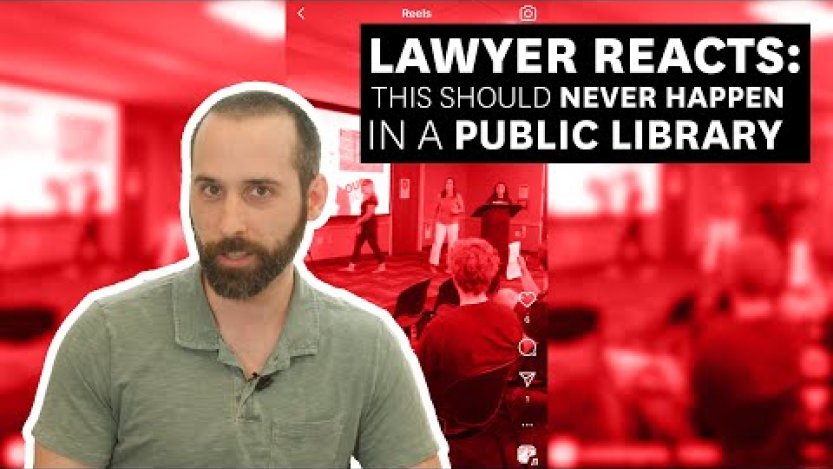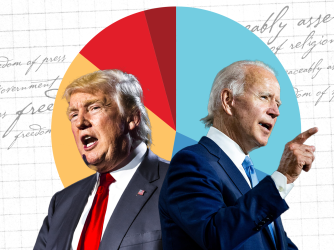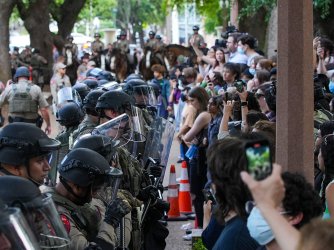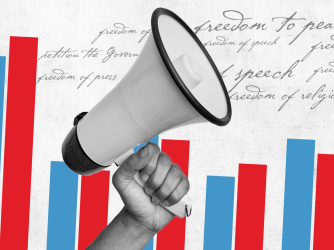Table of Contents
California library violates First Amendment, boots speakers for referring to transgender women as ‘biological men’

Shutterstock.com
UPDATED (Sept. 7, 2023): On Sept. 5, Yolo County responded to FIRE’s letter and said the county librarian reached out to the individual who reserved the room for the Moms for Liberty event and offered her a refund or a credit toward a future room reservation if she opted to reschedule the event. The county is also “reviewing the incident, the actions taken by Library staff, and our current Library policies to ensure that they are implemented in compliance with the First Amendment.” As part of that process, the county is “working on updating the Library’s policies for future events to better guide patrons, guests, and staff.”
FIRE will continue monitoring the situation in Yolo County to ensure protection of library users’ First Amendment rights.
When the government hosts its own programming, it can pick and choose which speakers it wants to feature. But when it opens space such as library meeting rooms for the public to hold their own speaking events, the First Amendment applies. And the First Amendment restrains authorities from discriminating against speakers based on their views or forcing them to use the government’s preferred vocabulary.
That’s why FIRE’s First Amendment alarm bells were ringing when a California public library manager abruptly shut down an event focused on women and girls in sports because the event’s speakers said “male,” “men,” and “biological men” when referring to transgender women. In shutting down the event — which took place in a publicly available meeting room reserved by the event organizers — the manager claimed the speakers’ language violated library policy and the library’s understanding of California law.
But as FIRE explained in a letter sent to the Yolo County Library today, public libraries can’t shut down private groups’ events in meeting rooms just because they don’t like the words speakers use when discussing certain topics.
Shutting down debate

On Sunday, Aug. 20, the Yolo County, California, branch of Moms for Liberty hosted an event in a publicly available meeting room at the Davis branch of the Yolo County Library. The event, entitled “Forum on FAIR AND SAFE Sport for GIRLS,” was to feature several speakers focused on topics such as: “Empower[ing] and protect[ing] girls’ sports and female athletes.”
In a video taken prior to the forum, Yolo County Library regional manager Scott Love tells a person affiliated with the event that California state law “recognizes transgender as protected.” He added:
If you’re speaking about a transgender female, they need to be referred to as a female. Transgender male needs to be referred to as a male. And if there’s any misgendering … if it’s by any of the organizers, they will be asked to leave. There’s no exceptions.
Sophia Lorey, outreach coordinator for the advocacy organization California Family Council and a former college athlete, opened the forum by talking about the event agenda, noting that speakers would talk about the “physiological advantage of male athletes” and the “emotional and psychological impact on girls when men play on their sports teams.”
Lorey’s comments prompted an audience member to ask if she was “going to be misgendering people” throughout the event. In a video of the event, Love can be heard saying that California state law contains protections for transgender status. He added that library policy prohibits misgendering: “Our policy talks about treating people with respect, and if you are misgendering somebody, that is not respectful.”
Whether it’s ideologically driven book removals or attempts to deny resources to groups with disfavored views, public libraries have unfortunately become a key battleground in the culture war.
When Lorey again talked about “men playing in women’s sports,” Love and members of the audience interrupted her. Someone suggested that Lorey instead say “biological” men, but Love told Lorey she could not say that either and would be asked to leave if she repeated it. After Lorey again referred to “biological men” playing women’s sports, Love asked Lorey to leave and said that if the “misgendering” continued, he would shut down the meeting.
Ultimately, that’s what happened.
After several minutes of discussion, Love declared, “The program is over.” When another speaker took the podium, Love shut down the projector to prevent the program from continuing.
The next day, the Davis library branch reportedly received a bomb threat. While the person who made the threat is unidentified and the motivation for the threat is unclear, true threats of violence are reprehensible no matter their motivation — and they are not protected by the First Amendment.
What the speakers said at Sunday’s event, however, is undoubtedly protected speech.
Library manager needs a refresher on the First Amendment
FIRE’s letter to the Yolo County Library explained that the library’s suppression of the Moms for Liberty event is viewpoint-based censorship that violates the First Amendment.
According to its own website, the Davis library branch makes its meeting rooms “available for public use.” The meeting room rules stipulate: “Groups not associated with the Library must state clearly in any publicity that the meeting is not sponsored by the Library. Use of the meeting rooms does not constitute an endorsement by the Library.” The flyer for the Moms for Liberty event included language to that effect.
In making its meeting rooms available for public use, the library created a public forum where the First Amendment applies. Although government entities can establish reasonable, viewpoint-neutral policies for such spaces, they cannot impose restrictions based on the ideology or viewpoint of the speakers who use the meeting rooms. Love’s abrupt halting of the event because speakers used language expressing viewpoints that he (or spectators) disfavored, or that Love incorrectly thought violated state law, infringed the First Amendment rights of the speakers and the audience members who attended the event to hear the discussion.

America’s public libraries must not take up arms in the culture war
News
Brave Books is promoting “See You at the Library” events as an alternative to drag queen story hour. But it may not be welcome at all libraries.
The Supreme Court has called viewpoint discrimination an “egregious” form of censorship. As the Court said in Texas v. Johnson, “If there is a bedrock principle underlying the First Amendment, it is that the government may not prohibit the expression of an idea simply because society finds the idea itself offensive or disagreeable.”
So in the present context, no government official or employee can declare by fiat that transgender women must be referred to as women and then silence speakers in a public forum who refuse to abide by the official’s preferred views and terminology.
When officials shut down debate by declaring certain words or phrases unsayable, they endorse what FIRE President & CEO Greg Lukianoff calls the “Perfect Rhetorical Fortress.” To build the fortress, you “determine what categories of speech — or even speakers — are off-limits, and then put any ideas you don’t want to listen to within those categories.” In essence, it’s a means of constructing barriers to discourse, effectively silencing certain narratives and viewpoints without directly addressing the underlying arguments.
The proper response, as always, is more speech. Those who disagree with the event speakers’ message are free to peacefully protest the event, or to hold their own event to argue that the speakers’ views and language choices are misguided, bigoted, or harmful. Dialogue, not debate-rigging censorship, is the way forward.
California state law does provide certain protections for individuals based on gender identity and expression, including protection from workplace harassment and discrimination. However, nothing in California law regulates how people can or must refer to transgender individuals in a public forum. Indeed, if such a provision did exist, it would be highly suspect as a constitutional matter. And of course, it should go without saying, a public library’s policies cannot override the First Amendment.
As we told the the Yolo County Library:
The First Amendment protects all speech unless it falls into one of the “historic and traditional categories” of unprotected speech, such as true threats, obscenity, defamation, or incitement. Absent more, referring to transgender women as “men” or “males” (or transgender men as “women” or “females”) does not fall into any category of unprotected speech.
Whether it’s ideologically driven book removals or attempts to deny resources to groups with disfavored views, public libraries have unfortunately become a key battleground in the culture war. As FIRE recently wrote:
Now more than ever, amid the partisan flare-ups that intensify polarization and kill dialogue, we need our society’s strongholds of free thought and free inquiry to hold fast to these principles. Any serious commitment to freedom of expression requires the protection of all views. The moment an institution ostensibly committed to incorporating and promoting the value of free expression starts to instead favor one political side or another, it will lose public trust and leave our country even more vulnerable to the forces of illiberalism.
FIRE calls on the Yolo County Library to immediately offer the local Moms for Liberty chapter an opportunity to reschedule their forum at the library. The library must also take steps to ensure that all of its branches will conform to the requirements of the First Amendment in the future.
Recent Articles
FIRE’s award-winning Newsdesk covers the free speech news you need to stay informed.

New FIRE poll: Americans equally skeptical Biden or Trump will protect First Amendment rights

Here’s what student journalists need to know about covering campus protests



